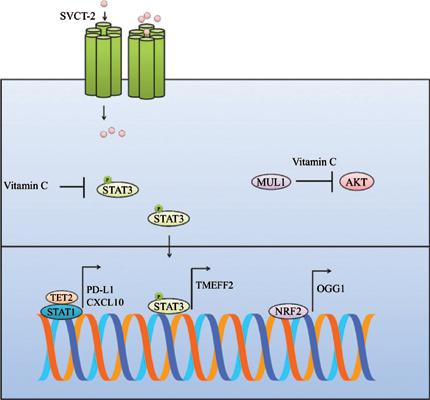Current Topics in Medicinal Chemistry ( IF 2.9 ) Pub Date : 2020-08-31 , DOI: 10.2174/1568026620666200710102841 Ghazala Butt 1 , Ammad A Farooqi 2 , Aima Adylova 3 , Rukset Attar 4 , Seher Yilmaz 5 , Konysbayeva K Konysbayevna 6 , Uteuliyev Y Sabitaliyevich 3 , Maria L Gasparri 7 , Baojun Xu 8

|
Treatment options for effective treatment of cancer with minimum off-target effects and maximum clinical outcomes have remained overarching goals in the clinical oncology. Vitamin C has remained in the shadows of controversy since the past few decades; burgeoning evidence has started to shed light on wide-ranging anticancer effects exerted by Vitamin C to induce apoptosis in drug-resistant cancer cells, inhibit uncontrolled proliferation of the cancer cells and metastatic spread. Landmark achievements in molecular oncology have ushered in a new era, and researchers have focused on the identification of oncogenic pathways regulated by Vitamin C in different cancers. However, there are visible knowledge gaps in our understanding related to the ability of Vitamin C to modulate a myriad of transduction cascades. There are scattered pieces of scientific evidence about promising potential of Vitamin C to regulate JAK-STAT, TGF/SMAD, TRAIL and microRNAs in different cancers. However, published data is insufficient and needs to be investigated comprehensively to enable basic and clinical researchers to reap full benefits and promote result-oriented transition of Vitamin C into various phases of clinical trials. In this review, we will emphasize on available evidence related to the regulation of oncogenic cell signaling pathways by Vitamin C in different cancers. We will also highlight the conceptual gaps, which need detailed and cutting-edge research.
中文翻译:

维生素C作为抗癌剂:调节信号通路。
以最小的脱靶效应和最大的临床结果有效治疗癌症的治疗选择仍然是临床肿瘤学的首要目标。自从过去的几十年以来,维生素C一直处于争议的阴影中。越来越多的证据开始揭示维生素C在诱导耐药性癌细胞中诱导凋亡,抑制癌细胞不受控制的增殖和转移性扩散所产生的广泛抗癌作用。分子肿瘤学的标志性成就迎来了一个新纪元,研究人员将注意力集中在维生素C调节不同癌症中的致癌途径上。但是,在我们的理解中,存在与维生素C调节无数种转导级联反应的能力有关的可见知识鸿沟。关于维生素C在不同癌症中调节JAK-STAT,TGF / SMAD,TRAIL和microRNA的潜在潜力,有分散的科学证据。但是,已发表的数据不足,需要进行全面调查,以使基础和临床研究人员能够充分利用其益处,并促进以结果为导向的维生素C过渡到临床试验的各个阶段。在这篇综述中,我们将重点介绍与维生素C在不同癌症中调节致癌细胞信号通路相关的现有证据。我们还将突出概念上的差距,需要进行详细而前沿的研究。已发表的数据不足,需要进行全面调查,以使基础和临床研究人员能够充分利用其益处,并促进以结果为导向的维生素C过渡到临床试验的各个阶段。在这篇综述中,我们将重点介绍与维生素C在不同癌症中调节致癌细胞信号通路相关的现有证据。我们还将突出概念上的差距,需要进行详细而前沿的研究。已发表的数据不足,需要进行全面调查,以使基础和临床研究人员能够充分利用其益处,并促进以结果为导向的维生素C过渡到临床试验的各个阶段。在这篇综述中,我们将重点介绍与维生素C在不同癌症中调节致癌细胞信号通路相关的现有证据。我们还将突出概念上的差距,需要进行详细而前沿的研究。











































 京公网安备 11010802027423号
京公网安备 11010802027423号